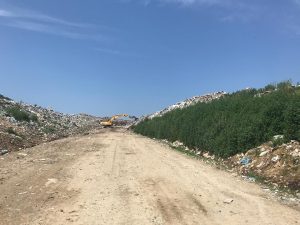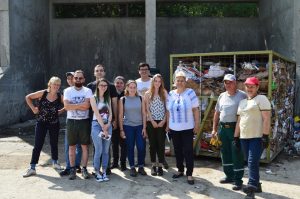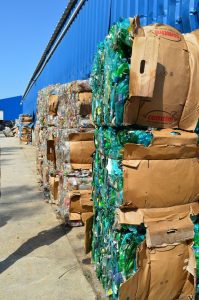Recycling Differences
Being working in an environmental project the past 9 months and now approaching to end of it got me comparing the waste management and recycling system between Portugal and Romania.
For what the colors go it is the same blue for paper and carton, yellow Plastic/Metal, green for glass and brown for organic waste/food leftovers. In Portugal in every recycling container spot there usually a small red one for the electronic such as batteries and here I didn’t saw a lot if any of those.
By the Paris agreement majority of EU countries set a 50% mark. This basically means that half of their trash should be recycled and both Portugal and Romania are not really following this.
Romania statistics say that only 14% of all the trash made is recycled while Portugal has 39% which is better but still not the goal that they’ve set for 2020 and asked to the EU for two extra years to achieve this goal which was denied.
While my EVS we had one truck passing every Friday for the non-recyclable trash and for the recyclable trash was passing every 2 weeks. Back in Portugal as far as I remember the truck for the non-recyclable passes twice a week while the recyclable passes once per week. In this field I think it isn’t that bad since I come from an average city with way more population than the village that I was living during my EVS.
I had the opportunity to visit both a landfill in Romania and in Portugal and I can see that there’s a big difference. In Romania I visited a landfill from Valeni de Munte and It was a big difference. In here they did almost all the things by hand without help of machinery which is probably one of the causes of the different percentage in recycling rate. While In Portugal there’s a big use of heavy machinery and probably a bigger budget going into this field and having machines helping is good since they can accelerate all the process and having more recyclable trash coming and therefore recycle more.

How the visit to the landfill raise awareness of young people / Cum o vizită la groapa de gunoi i-a făcut pe tineri mai conștienți
On the 20th of June happened a trip to the landfill (first one organized by me) with EVS volunteers as well as local volunteers. During organization I asked to be a bit more specific with details to cause more impact since the participants majority of them were adult of teens so I wanted the visit to cause impact on them. 
During the visit we had a lot of information with a lot of numbers we were given a lot of information about the different stages of waste sorting and how do they deal with the waste. For example what happens after the truck passes your house and takes your recyclables?.
They go to the landfill and are sorted manually by the employees of the sorting center and then they go different machines to be pressed and packed and after that according to the material (paper, plastic of different colors, glass) these new pressed and packed recyclables are sold to other companies in Prahova and these take over the recycling process.
 Ok so now you know what happens to the recyclables what about the rest of the trash?
Ok so now you know what happens to the recyclables what about the rest of the trash?
Well that was the shocking part in my opinion. The rest of the trash ends up in the landfill, which is currently reaching the maximum amounts and will soon have to be sealed!
The landfill has licence for 10 more years and if it keeps getting the trash at this rate will be sealed in less than 4 years. I think that the next step is to not throw everything together to the trash and pay even more attention and spread more the word about recycling.
All of this was very interesting in a point for us EVS to compare this system from what it is back in our countries. I know for me there are a lot of differences.
Just to finish this little Landfill visit walkthrought I wanted to point out that due to financial reasons a big part of the equipment that they have is not working because they don’t have the money for it and so on they need to use smaller machines which slows the process.

(Mountain of trash from the landfill)
After the visit I asked some question to the participants about the visit and got some very interesting answers and I was very pleased with them because I saw that the visit actually had some impact on them.
The questions were:
1– What kind of information did the visit to the landfill gave to you?
2– What was the thing that shook you the most?
3– What do you think we can do to change this situation?
The answer for questions one and two were pretty general most of the participants said that they got information that couldn’t get anywhere else, that there is a lot of waste coming to the landfill from very small areas, the people around don’t recycle enough and that the landfill didn’t had enough money to develop recycling process and to deal with more trash.
What shook them the most was pretty general as well and majority of the answer say that machines not working due to financial problems, the amount of trash that gets there and the lack of recycling around the commune.
When it comes to answer number three that’s where things spice up a little bit from revolution to “convince big players” against the use of plastic to spread the word and promote the idea of recycling but there is one answer that really stands out and I would like to share it with you.
“At the beginning a serious campaign to inform people what they can throw in their trash-bin( ex: that the
biodegradable stuff should not be put in there), the calendar for recycling materials( usually people loose the
counting and don’t know in which Wednesday the truck will come), what is the process at the landfill(some shocking
facts to trigger something in the people ́s minds) eventually to talk with a city hall representative and find together a
solution to deliver that information to the population. I strongly believe that we should work not only with kids, but also with
the grown ups because the decision about waste is in their hands and they really need a good speech in order to
start paying more attention to their waste.”
So does/did the landfill raised awareness to the young people?
I would say YES. At the end I got very good feedback and very good ideas and arguments regarding what they’ve saw in the landfill and also not only the participants but also me I was super shocked with all the info and I felt that we should do something about it. Visiting your local landfill is something that I really recommend specially if you are concerned with this environmental topic because you’ll see things that you never thought about it and in the end you’ll learn new stuff and you will see the reality of it.
I would like to thank Georgeta Marcu, responsible for environmental protection of the place and our guide who explained everything super clear and of course thanks to all the participants.
—
Pe 20 iunie a avut loc o excursie la depozitul de deșeuri (prima dată organizată de mine) cu voluntari EVS, precum și voluntari locali. În timpul organizării am cerut să fie un pic mai specific cu detalii pentru a provoca un impact mai mare, deoarece majoritatea participanților erau adulți sau adolescenți, am dorit ca vizita să provoace un impact asupra lor.
În timpul vizitei am primit multe informații cu o mulțime de numere, ni s-au oferit multe informații despre diferitele etape ale sortării deșeurilor și cum trebuie să se ocupe de acestea. De exemplu, ce se întâmplă după ce camionul trece pe la casa ta și îți ia reciclabilele.
Se duc la depozitul de deșeuri și sunt sortate manual de către angajații centrului de sortare, apoi merg spre diferite mașini pentru a fi presate și ambalate iar, după aceea, în funcție de material (hârtie, plastic de diferite culori, sticlă) noile reciclabile presate și ambalate sunt vândute altor companii din Prahova acestea preluând procesul de reciclare.
Bine, deci acum știți ce se întâmplă cu reciclabilele, dar cum rămâne cu restul de gunoi?
Ei bine, aceasta a fost partea șocantă, în opinia mea. Restul de gunoi ramâne în depozitul de deșeuri, care atinge în prezent limitele maxime și în curând va trebui să fie sigilat!
Depozitul are licență încă 10 ani și, dacă va continua să primească gunoi, va fi sigilat în mai puțin de 4 ani. Cred că, următorul pas este să nu aruncați totul la coșul de gunoi și să acordați și mai multă atenție cât și să răspândiți mai mult idea despre reciclare.
Toate acestea au fost foarte interesante dintr-un punct de vedere pentru voluntarii EVS pentru a compara acest sistem cu ceea ce este în țările lor. Știu că în cazul meu există o mulțime de diferențe.
Tocmai pentru a termina această mică vizită a depozitului de deșeuri, am vrut să subliniez că, din motive financiare, o mare parte din echipamentele pe care le au…nu funcționează, deoarece nu au bani pentru asta, deci trebuie să folosească mașini mai mici, care încetinesc procesul.
După vizită, am pus niște întrebări participanților despre vizită și am primit câteva răspunsuri foarte interesante și am fost foarte mulțumit de ei, deoarece am văzut că vizita a avut efect asupra lor.
Întrebările au fost:
1– Ce fel de informații ți-a oferit vizita la depozitul de deșeuri?
2– Care a fost lucrul care te-a șocat cel mai mult?
3– Ce crezi că putem face pentru a schimba această situație?
Răspunsurile la primele două întrebări au fost destul de generale, majoritatea participanților au spus că au primit informații pe care nu le pot primi din altă parte, că există o mulțime de deșeuri care ajung în depozitul de deșeuri din zone foarte mici, oamenii din jur nu reciclează suficient și respectiv că depozitul de deșeuri nu a avut suficienți bani pentru a dezvolta procesul de reciclare și pentru a face față mai multor gunoi.
Răspunsul la ceea ce i-a șocat cel mai mult a fost destul de general de asemenea și majoritatea se referă la mașinile care nu funcționează din cauza problemelor financiare, cantitatea de gunoi care ajunge acolo și lipsa de reciclare în jurul comunei.
Când vine vorba de răspunsurile de la numărul trei, acesta este locul în care lucrurile se încing puțin când e vorba de a convinge „marii jucători” împotriva utilizării plasticului pentru a răspândi și a promova ideea de reciclare, dar există un răspuns care într-adevăr iese în evidență și pe care aș vrea să-l împărtășesc cu voi.
“La început, trebuie o campanie serioasă de informare a oamenilor despre ce pot arunca în coșul de gunoi (ex: că nu trebuie introduse materialele biodegradabile acolo), calendarul pentru reciclarea materialelor (de obicei oamenii pierd numărarea și nu știu în care miercuri va veni camionul), care este procesul de la depozitul de deșeuri (unele fapte șocante pentru a declanșa ceva în mintea oamenilor), iar în cele din urmă, pentru a discuta cu un reprezentant al primăriei și pentru a găsi împreună o soluție pentru a furniza aceste informații populației. Cred cu tărie că ar trebui să lucrăm nu numai cu copiii, ci și cu cei mari, deoarece decizia despre deșeuri este în mâinile lor și au nevoie cu adevărat de un discurs bun pentru a începe să acorde mai multă atenție deșeurilor lor. ”
Prin urmare vizita la depozitul de gunoi a făcut conștientizarea tinerilor?
Aș spune DA. La final am primit un feedback foarte bun dar, și idei și argumente foarte bune cu privire la ceea ce au văzut în depozitul de gunoi și, de asemenea, nu numai participanții, dar și eu, am fost super șocat cu toate noutățiile și am simțit că ar trebui să facem ceva în acest sens. Vizitarea depozitului vostru local ar fi un lucru pe care îl recomand cu adevărat, în special dacă sunteți preocupat de acest subiect despre mediu, deoarece veți vedea lucruri la care nu v-ați gândit niciodată și, în final, veți învăța lucruri noi și veți vedea realitatea acestuia.
- Aș dori să îi mulțumesc Georgetei Marcu, responsabilă cu protecția mediului locală și ghidului nostru care a explicat totul foarte clar și, desigur, mulțumesc tuturor participanților.
How can technology help to reduce waste?
According to ONU the world population will reach 8.3 billions people in 2030 with an increase of 1 billion people in 13 years. In all of the challenges of a massive increase of the population the increase of waste is one of the biggest. According to a scientific magazine “Science Advances” more than 13 billions tons of waste will be thrown at landfills and at the environment at 2050 if the rates of waste production keep the same.
This is major issue for our Planet Earth and for our own health. With so many tons of waste being produced every day over the entire globe the employes in this industry can not keep up with every trash that enters the center, for example the Sims Municipal Recycling Facility in Brooklyn is the largest recycling facility in the USA it receives around 800 tons of recycling material every single day so with this amount of trash its normal that human employees can’t keep up with everything therefore needing help from technology.
Ok when we think about technology we think about very complex things like flying cars but in this case technology can be as simple as huge magnet to separate metal from plastic. Yes of course there are more complex of using technology for example:
In 2010 in Japan a scientist by the name Akinori Ito developed a machine that turns plastic bags into oil basically the inverse process of how plastic bags are made. This machine is so revolutionary that during the process it does not release polluting gases to the environment is totally “Green”. This invention created in 2010 is capable of transforming 1kg of plastic bags into 1l of oil and it has been already sold to 80 countries
model of Akinori Ito machine
In my opinion in the future I thinks that this waste problem can be solved with a huge help of technology but i’m also afraid that we start to make drastic changes when its too late, we can’t only depend on technology to solve this problem we need to take measures as well. What do I mean with this? Recycling is one of the main option but not only check in your town there must be a kind of event to clean the streets, beaches. There nothing like that in your city? Why not creating your own? If we wait too much to start to do something regarding this topic it can be too late for the Earth and for us. We were given so much the only planet in the solar system with life. I mean, we are one in a million and I don’t wanna get too spiritual, but how are we not a miracle? We are perfectly positioned to the sun so we don’t burn but not too distant so we don’t turn to ice. As Richard Williams once said and I quote “Planet Earth is 4.5 billion years old. Mankind? About 140,000 years old. Let me put that in perspective. If you condense the Earth’s lifespan into 24 hours, that’s one full day, then we have been here on this planet for… three seconds.”
Three seconds and look what have we done, we call ourselves Homo sapiens aka wise man, but are we so wise? Wisdom is different.While intelligence speaks,wisdom listens and we covered our ears to mother nature screams and closed our eyes to all her “Help Wanted” signs. One thing i’m sure only if we do this together as humans we can make it to the fourth second.